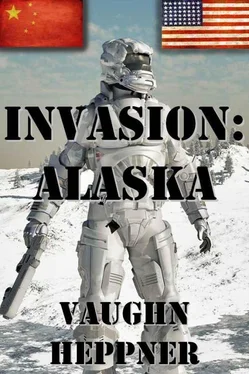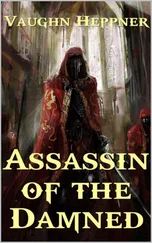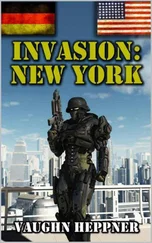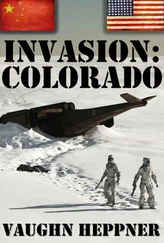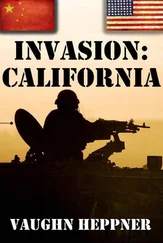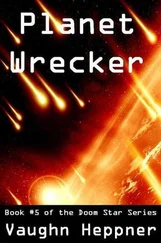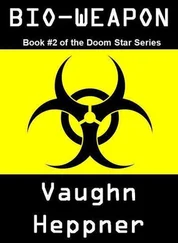There was another man listening to the semis rumble. He was a former American, and he stood at the front of the mob. At times the pressure from behind pushed him against the gate. He didn’t know it, but more people kept arriving. They joined the throng and packed the street as they added their chants. The echoing sounds were like thunder to others in the city, drawing the curious and frightening the rest, particularly the police and local Party members.
The former American, Henry Wu, gripped cold bars as bodies pressed against him. He grunted and pushed with his arms, straining as he shoved his back against the men behind, trying to gain breathing room. Henry had immigrated to China four years ago in 2028. He was a tractor driver, and had been living in the city his father had escaped twenty-five years ago. Most of the Chinese in Hanzhong were Han, but Henry was Manchu—a trifle taller than those around him and possessed of a singular difference: a gun.
Gaining space, Henry released the bars and shoved his hands into his coat pockets. In the left pocket his fingers curled around a Glock 19, an old semiautomatic smuggled into China when he’d immigrated. Henry was sick of being hungry, and along with everyone else he was angry that their rice was being shipped to the coast. He knew he shouldn’t have brought the Glock, but he had it just the same.
He’d left America to find work. In China, there were jobs, but since the glaciation had worsened several years ago, there wasn’t enough food. A week ago, he’d talked to his sister over the phone. She lived in Detroit. There was food in the U.S., she said, but after the Sovereign Debt Depression, there was seldom enough work.
Is it too much to ask for both? Henry thought to himself.
A burly militiaman blew a whistle, the normally piercing blast barely audible over the mass chanting. The militiaman stepped out of the line of guards, bringing a rifle-butt to his shoulder. The other militia stared at him, some with amazement. They were young men and clearly frightened by today’s events.
Henry craned his neck, looking to see what the commotion was about. Oh. A pimple-faced teenager shimmied up the bars. Reaching hands shoved him higher. The teenager moved carefully over the barbs, trying not to stick himself.
The aiming militiaman opened his mouth, letting the silver whistle drop to his chest. He shouted, or at least it looked like he did; the volume from the chanting horde drowned out his words. Regardless, his actions spoke loudly enough. Something must have made the militiaman pause. He glanced back at his companions. None of them had dared raise a rifle. The militiaman gestured angrily at them, berating his fellows. Was he the First Rank? He looked older than the rest, and the marks on his uniform were different.
A militiaman in the line shook his head at the First Rank. The others just looked at the older man.
Snarling, the First Rank took two steps toward the gate. He aimed his rifle at the teenager and fired. The sound was loud. Those nearest quit chanting and the teenager slumped onto the barbs. He twitched in death, snared on the iron fence.
While others shifted their cell phones, recording this, Henry found himself aiming his Glock. He squeezed off a shot. The banging retort hurt his ears. It made men around him flinch. The gun bucking in Henry’s hands shocked him.
The First Rank staggered backward as the bullet plowed through his stomach, blowing out cloth, flesh and intestines. The rifle fell as the First Rank hit the pavement, his head pointed away from the mob and toward the hidden semis.
The crowd went wild as it watched the hooked teenager. Men clutched the bars and madly rattled the fence. It groaned, leaning inward.
The remaining militia backed away from the enraged chanters. Then the militiaman on the left end of the line hurled his rifle away. Spinning around as his rifle bounced across the cement, the young man sprinted for the depths of the rice-processing plant. The panic was contagious as the example routed through sixteen numbed and frightened brains. Two other militiamen followed the deserter. That must have wilted whatever courage remained among the others. They rest turned to run, although several kept their weapons.
As the last militia disappeared around the nearest building, the crowd surged against the iron bars. The bars groaned and leaned farther inward. The front rank, including Henry, scrambled over bars, causing many of the poles to crash to the ground. Henry raced at the front of the horde, determined to grab several bags of rice.
The flight of the militia spread back through the mob like wildfire. It emboldened the horde, and the chanting increased in volume. Like a living beast, the mob surged forward.
Ten minutes later and at the rear of the mob, ninety Hanzhong policemen arrived. Jumping out of armored carriers, they drew batons and tasers. Blowing whistles, the police charged into the crowd, swinging batons and shocking people.
It should have worked. This was China, and the normally cowed populace had generations of obedience trained into them. Today it was different, because the mob had tasted victory. It was like a tiger drinking human blood. It liked the taste and wanted more. Perhaps as importantly, several of the dropped rifles made it into the rioters’ hands.
Shots rang out. Policemen fell to the pavement. Buoyed by success, young men in the mob picked up rocks, bottles—anything. They rained debris onto the surprised police as popping shots sounded. More baton-wielders fell dead. Young men howled and they charged en mass. They bowled over policemen and ripped away batons. The beatings began immediately, as did the merciless tasing of their former tormentors.
Some police made it back to the carriers. They climbed aboard, managing to fight off their attackers and drive for the nearest police headquarters. It was a massive building with two gleaming lion statues in front. There the police barricaded themselves behind heavy doors and the latest security systems.
Eighteen policemen died on the street. They were clubbed, tased until heart failure, or shot. It was a heady feeling for the rioting masses, and they wanted more, much more.
The police in the station radioed for outside help, and news of the trouble quickly reached the highest levels. As the police in the barricaded headquarters passed out rifles and took positions at the windows, a convoy of heavy trucks left the city of Guangyuan forty kilometers away. A different convoy roared from Baoji. Together, the two convoys raced three thousand riot police toward Hanzhong and its gigantic rice processing plant.
By now, the Hanzhong police were phoning one another, wondering what to do. They were frightened by the boldness of the rioters. They dreaded the looting and reached a quick consensus: to wait for reinforcements.
The first convoy reached Hanzhong at three twenty-four in the afternoon. The second arrived forty-three minutes later. A phone call from a raving police general in Baoji convinced the Hanzhong chief of police to begin riot suppression.
The Army cut city communication cables. Rushed electronic warfare (EW) units landed via helicopter and jammed satellite connections three hours later. Hanzhong was blacked out as the riot police, Army MPs, and revitalized Hanzhong police began to suppress looters, rioters, and subversives.
The police turned brutal then, wanting retribution. Nothing angered a master like a revolting slave. China was an ordered society, and the police gave the orders. The shooting began in earnest.
Then the higher powers began to arrive: The Dong Dianshan —East Lightning. They were the Party Security Service and landed at Hanzhong Airport at 7:19 PM. They wore brown uniforms with red straps running from the right shoulder to the red belt around their waist. An armband on their left arm showed a three-pronged lightning bolt. Each was a card-carrying member of the Socialist-Nationalist Party—what the former Communist Party had transformed into. Among their varied talents, East Lightning was practiced at rooting out ringleaders and enemy saboteurs.
Читать дальше
